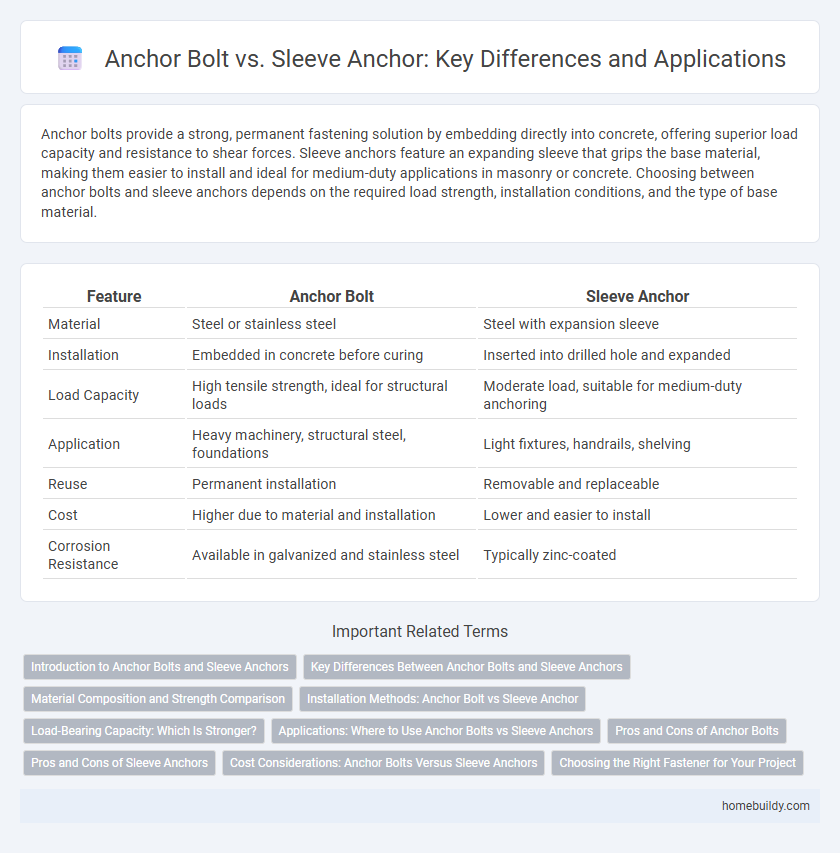Anchor bolts provide a strong, permanent fastening solution by embedding directly into concrete, offering superior load capacity and resistance to shear forces. Sleeve anchors feature an expanding sleeve that grips the base material, making them easier to install and ideal for medium-duty applications in masonry or concrete. Choosing between anchor bolts and sleeve anchors depends on the required load strength, installation conditions, and the type of base material.
Table of Comparison
| Feature | Anchor Bolt | Sleeve Anchor |
|---|---|---|
| Material | Steel or stainless steel | Steel with expansion sleeve |
| Installation | Embedded in concrete before curing | Inserted into drilled hole and expanded |
| Load Capacity | High tensile strength, ideal for structural loads | Moderate load, suitable for medium-duty anchoring |
| Application | Heavy machinery, structural steel, foundations | Light fixtures, handrails, shelving |
| Reuse | Permanent installation | Removable and replaceable |
| Cost | Higher due to material and installation | Lower and easier to install |
| Corrosion Resistance | Available in galvanized and stainless steel | Typically zinc-coated |
Introduction to Anchor Bolts and Sleeve Anchors
Anchor bolts are heavy-duty fasteners designed to secure structural elements to concrete, providing critical stability in construction projects. Sleeve anchors, a specific type of anchor bolt, feature an expanding sleeve that grips the concrete when tightened, offering versatile use for medium-load applications in masonry and concrete. Understanding the differences in installation methods and load capacities helps determine the appropriate anchor for structural integrity and safety.
Key Differences Between Anchor Bolts and Sleeve Anchors
Anchor bolts are embedded in concrete and primarily designed to secure structural elements, providing strong resistance against tension and shear forces. Sleeve anchors, on the other hand, are mechanical anchors that expand inside pre-drilled holes, suitable for fastening fixtures to solid materials like concrete and masonry without requiring embedment. The key differences lie in installation methods, load capacities, and suitability for dynamic versus static loads, with anchor bolts favored for permanent structural connections and sleeve anchors for lighter, non-structural applications.
Material Composition and Strength Comparison
Anchor bolts are typically made from carbon steel or stainless steel, offering high tensile strength and excellent corrosion resistance, making them ideal for heavy-duty applications. Sleeve anchors, generally constructed from zinc-plated steel or stainless steel, provide moderate strength suitable for lighter loads and offer decent resistance to rust but fall short compared to anchor bolts in durability. The material composition directly influences the anchor's strength and suitability; anchor bolts deliver superior load-bearing capacity, while sleeve anchors balance ease of installation with adequate strength for less demanding environments.
Installation Methods: Anchor Bolt vs Sleeve Anchor
Anchor bolts require pre-drilled holes and are typically embedded in concrete with epoxy or grout for secure load-bearing capacity. Sleeve anchors expand against the hole walls as the bolt is tightened, providing strong mechanical interlock without adhesive. Installation time for sleeve anchors is generally faster and less dependent on curing, making them suitable for immediate load application compared to anchor bolts that require setting and curing.
Load-Bearing Capacity: Which Is Stronger?
Anchor bolts generally offer higher load-bearing capacity compared to sleeve anchors due to their deep embedment and ability to transfer tensile and shear forces efficiently into concrete or masonry. Sleeve anchors rely on expansion within the substrate, which can result in lower pull-out resistance under heavy loads. For critical structural applications requiring maximum strength and stability, anchor bolts are typically the preferred choice over sleeve anchors.
Applications: Where to Use Anchor Bolts vs Sleeve Anchors
Anchor bolts excel in heavy-duty applications requiring secure attachment to concrete foundations, such as in structural steel, machinery installation, and commercial building construction, providing superior load-bearing strength and resistance to tension and shear forces. Sleeve anchors are ideal for medium-duty fastening in masonry materials like brick, block, and concrete, commonly used for securing fixtures, handrails, and window frames where moderate holding power and ease of installation are priorities. Selecting between anchor bolts and sleeve anchors hinges on specific load requirements, substrate type, and installation environment to ensure optimal performance and safety.
Pros and Cons of Anchor Bolts
Anchor bolts provide superior load-carrying capacity and are ideal for heavy-duty applications requiring strong structural anchoring in concrete. They offer excellent resistance to shear forces and corrosion when made from stainless steel, but installation demands precise positioning and can be time-consuming due to setting in wet concrete. Compared to sleeve anchors, anchor bolts have limited adjustability after installation, making them less flexible for dynamic or temporary connections.
Pros and Cons of Sleeve Anchors
Sleeve anchors offer strong holding power in concrete, brick, and block materials, making them versatile for various construction applications. Their expansion mechanism provides excellent resistance to pull-out forces but may cause material stress or cracking in softer substrates. Unlike anchor bolts, sleeve anchors are easier to install without pre-embedded components, but they generally offer lower load capacities and less durability under heavy or dynamic loads.
Cost Considerations: Anchor Bolts Versus Sleeve Anchors
Anchor bolts typically incur higher initial material and installation costs compared to sleeve anchors due to their heavy-duty steel composition and embedded installation requirements. Sleeve anchors offer a more cost-effective solution for medium-load applications, combining easier installation with moderate strength performance. Selecting between anchor bolts and sleeve anchors should factor in not only upfront costs but also long-term durability and maintenance expenses in specific structural environments.
Choosing the Right Fastener for Your Project
Choosing the right fastener depends on the material and load requirements, with anchor bolts offering superior strength and durability for heavy-duty concrete anchoring. Sleeve anchors provide versatility for use in concrete, brick, and block, making them ideal for medium-load applications and easier installation. Assessing specific project needs such as environmental conditions, shear forces, and withdrawal resistance ensures optimal performance and safety.
Anchor bolt vs Sleeve anchor Infographic

 homebuildy.com
homebuildy.com